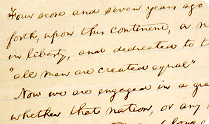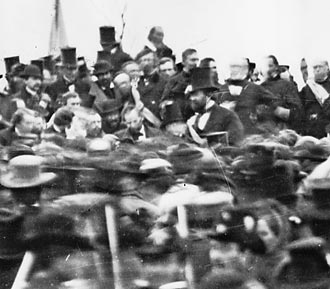Lincoln’s Gettysburg Address
Monday, November 19, 2009
7:00 p.m.–8:30 p.m. (EST)

Leader
Julian Clarence Levi Professor in the Humanities
Director of American Studies, Columbia University
National Humanities Center Fellow
About the Seminar
In a speech that lasted barely three minutes but that has since become a touchstone of American democracy, Abraham Lincoln spoke at the site of a decisive battle in which nearly 8,000 Confederate and Union soldiers had been killed and more than 30,000 wounded. Why has the “Gettysburg Address” achieved almost scriptural status for American culture? What, in Lincoln’s view, was at stake in the battle and the larger war for which it proved to be the turning point? How can we account for the majesty and precision of Lincoln’s language? We will discuss these and other questions through a close reading of the speech and consideration of the context in which Lincoln delivered it.

Enter Moodle Forum
Assigned Readings
To incorporate seminar texts into your teaching, we offer the National Humanities Center’s Primary Document Application Form.- Abraham Lincoln, Gettysburg Address, November 19, 1863.
- “Fragments on Slavery,” “Letter to Horace Greeley,” and “Second Inaugural Address,” from The Portable Lincoln, edited by Andrew Delbanco.
- Thomas Jefferson, Notes on the State of Virginia, Query 14 (excerpt).
- “Manners,” from Jefferson’s Notes on the State of Virginia.
- John C. Calhoun, Oregon Bill Speech, 1848.
- Walt Whitman, “Song of Myself,” Section 10 (Fugitive slave section).
- Alexander Stephens, “Cornerstone Speech,” March 21, 1861 (excerpt).
- Abraham Lincoln, Second Inaugural Address, March 4, 1865.
- Frederick Douglass, “Oration in Memory of Abraham Lincoln,” April 14, 1876 (excerpt).
Supplementary Readings
- “The Gettysburg Address,” Lincoln’s Sword, by Douglas L. Wilson.
- “Lincoln’s Sacramental Language,” by Andrew Delbanco, in Our Lincoln, edited by Eric Foner.
- “Revolution in Thought,” and “Revolution in Style,” Lincoln at Gettysburg, by Garry Wills.
